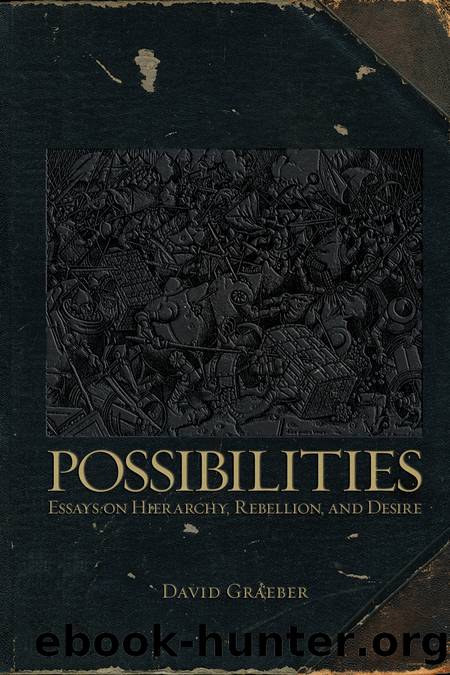Possibilities: Essays On Hierarchy, Rebellion, and Desire by David Graeber

Author:David Graeber
Language: eng
Format: epub
Publisher: AK Press
Published: 2013-07-02T16:00:00+00:00
7 - Love Magic and Political Morality in Central Madagascar, 1875–1990
This essay sets out from a simple question. Why is it that at the end of the last century, people in Imerina in central Madagascar seem to have universally assumed that it was men who used ody fitia, or “love medicine”—while, when I was living there between 1989 and 1991, absolutely everyone I spoke to took it for granted that it was women who did so? This question is linked to another. In both periods, love medicine was clearly the stuff of scandal. But over the last hundred years, what is scandalous about it appears to have changed. Nineteenth-century texts invariably emphasized that what were called love medicines were really forms of violence: not only did they humiliate their victims, often in spectacular ways, they also could do very real physical harm. The people I knew were just as disapproving. But what they disapproved of in love medicine was something very different: the fact that people under its influence would do whatever their enchanter told them, that they were, in effect, enslaved.
The change is all the more dramatic because if one looks at most of what was written about medicine in the nineteenth century—what we would ordinarily call “magic”—it’s almost exactly the same as what people say about medicine in the present day. You see the same lists of charms and spells, the same sorts ceremonies and ingredients: bits of wood, metal ornaments, the same colors and varieties of magical beads. What people say about the sorts of medicine used in protecting crops or helping one in lawsuits or business deals has hardly changed at all. What people say about love medicine on the other hand seemed to have transformed completely. Why? What had happened in the meantime?1
The Argument
For an anthropologist, one of the more unusual things about Madagascar is that it seems to lack any sense of a bygone mythical age. Most societies have a fairly clear sense of a time of origins, a time when, say, the distinctions between animals and humans and gods were not yet established, when creatures far more powerful than exist nowadays were able to create rivers and mountains and institutions like marriage, or even life itself. Often this is followed by a heroic age, in which humans, while no longer capable of such cosmic acts of creativity, were still able to wield powers that no longer exist in these current, fallen, times. In Madagascar this sort of view of history was strikingly absent. Founding ancestors, for example, were almost never represented as being in any way superhuman: they were simply men and women who traveled, farmed, and raised families just as men and women do today.
This is not to say, however, that amazing powers were not available in the past. Folktales often feature mythic heroes who, by dint of their magic charms, or ody, are able to fly through the air, turn invisible, become impervious to their enemies, or even to blast them with lightning.
Download
This site does not store any files on its server. We only index and link to content provided by other sites. Please contact the content providers to delete copyright contents if any and email us, we'll remove relevant links or contents immediately.
| Anarchism | Communism & Socialism |
| Conservatism & Liberalism | Democracy |
| Fascism | Libertarianism |
| Nationalism | Radicalism |
| Utopian |
The Secret History by Donna Tartt(16623)
The Social Justice Warrior Handbook by Lisa De Pasquale(11489)
Thirteen Reasons Why by Jay Asher(7788)
This Is How You Lose Her by Junot Diaz(5771)
Weapons of Math Destruction by Cathy O'Neil(5036)
Zero to One by Peter Thiel(4824)
The Myth of the Strong Leader by Archie Brown(4789)
Promise Me, Dad by Joe Biden(4447)
Beartown by Fredrik Backman(4417)
Stone's Rules by Roger Stone(4415)
How Democracies Die by Steven Levitsky & Daniel Ziblatt(4398)
The Fire Next Time by James Baldwin(4342)
100 Deadly Skills by Clint Emerson(4077)
A Higher Loyalty: Truth, Lies, and Leadership by James Comey(4032)
Rise and Kill First by Ronen Bergman(4012)
The David Icke Guide to the Global Conspiracy (and how to end it) by David Icke(3881)
The Farm by Tom Rob Smith(3872)
Secrecy World by Jake Bernstein(3782)
The Doomsday Machine by Daniel Ellsberg(3731)
